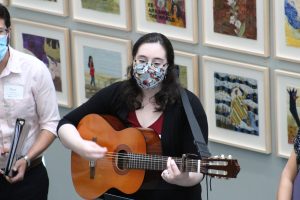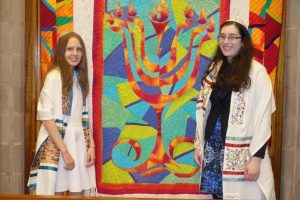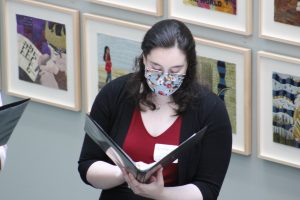Jewish learning Infusing Music into a Community

Each week, third-year cantorial student Kochava Munro (below with guitar) leads Friday evening services with guitar, sharing niggunim, or neo-Hasidic spiritual wordless melodies, with members of the Boston Synagogue.
An intern at the Martha Road shul, Kochava has been leading weekly Friday night services and twice-monthly Saturday morning services since her first year at Hebrew College. She is the first cantorial intern from Hebrew College to join the downtown Boston community.

The daughter of a cantor, Kochava has led services since childhood. She originally planned to become a high school math teacher, but rediscovered her passion for the cantorate in college, while leading High Holiday services for her then-boyfriend’s—now husband’s—childhood shul, Ohavi Zedek in Vermont. After graduation, she worked as a cantorial soloist and Hebrew school teacher at Ohavi Zedek synagogue for several years before coming to Hebrew College.
“After I led my first High Holiday service there, I thought to myself, this is really what I want to do,” she said. “It was a moving experience hearing all 400 people singing together in harmony. I felt like a true cantor, a spiritual leader that everyone looked up to. At that moment, I decided that I was going to pursue becoming an ordained cantor.”
She chose Hebrew College because of its location and pluralism and found out about the Boston Synagogue internship on the Hebrew College listserv. While she came to Hebrew College with a lot of work experience, she says that her coursework and internships have broadened her knowledge and given her an even deeper preparation for the cantorate.

Since the Boston Synagogue has no full-time rabbi, Kochava is responsible not only for spiritual leadership, but for Torah commentary, as well. She leads services both in-person and on Zoom. In addition to her role at the Boston Synagogue, she serves as a monthly Torah reader for Or Atid in Wayland, and as a High Holiday cantorial soloist at Temple Israel in Portsmouth, New Hampshire.
“What’s been new for me is preparing either Torah discussions or diverei torah introductions to the Torah service, which is something I would leave to the rabbi if I were co-leading with someone,” she said. “It’s forced me to really read the English of every parsha I’m chanting and think about how it applies to my life at this moment. I then form my thoughts into discussion questions to pose during the Torah service.”
This year, she is beginning her Masters of Jewish Education thesis on how clergy can use niggunim to impact the spiritual lives of their congregants—something she already does through her work at the Boston Synagogue. She plans to survey the ordination student body to see if their spiritual practice has changed since incorporating niggunim into their practice.

She has already noticed a difference in the Boston Synagogue since she introduced niggunim, as congregants are now singing along with her. The congregation has been inspired by her music as well.
“It’s really been wonderful,” said Susan Schreiner-Weingarten, chairperson of the board at the Boston Synagogue. “There is a peacefulness to her services, and it was particularly meaningful in those early days of COVID, when people were isolated and going through a lot. Kochava would introduce different melodies and construct a warm and opening experience. Her services really became touchstones for people.”

